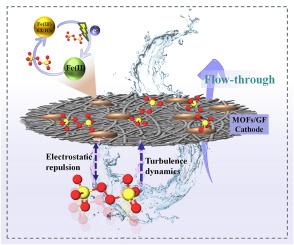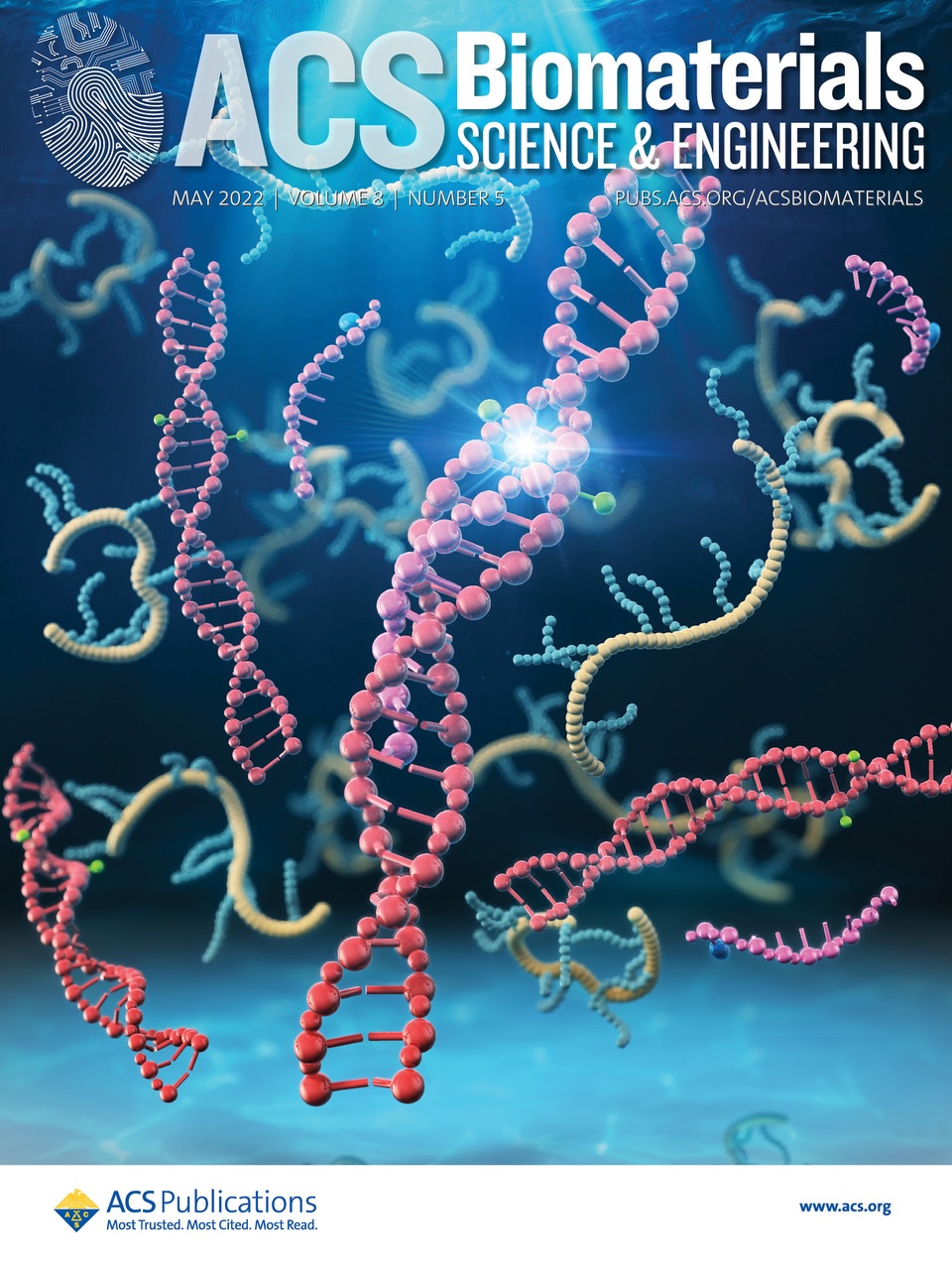增强铁(III)/铁(II)循环和传质策略,通过直流铁-MOFs 阴极高效、稳定地活化过硫酸盐以净化水。
IF 5.4
2区 医学
Q2 MATERIALS SCIENCE, BIOMATERIALS
引用次数: 0
摘要
过渡金属基阴极电活化过硫酸盐(PS)的效率和稳定性受铁(III)/铁(II)的循环和 PS 的传质控制。本研究首次制备了混合价MOFs催化剂(FeII-MIL-53(Fe))改性流通阴极。FeII-MIL-53(Fe) 的制备方法是用 Fe(II) 取代 MIL-53(Fe) 中的部分铁氧网络结构,从而形成配位不饱和铁中心 (CUIC)。铁(III)配位不饱和铁中心(CUIC)的增加促进了铁(III)向铁(II)的转化。此外,电场还进一步促进了铁(III)/铁(II)的循环。同时,计算流体动力学(CFD)模拟显示了流通阴极的流体动力学行为。淬灭实验和电子顺磁共振(EPR)结果表明,产生了多种活性物质(SO4--、-OH、O2--和 1O2)。总之,这项工作为高效、稳定地电活化 PDS 提供了一种有效的策略。本文章由计算机程序翻译,如有差异,请以英文原文为准。

Enhanced cycling of Fe(III)/Fe(II) and mass transfer strategy for efficient and stable activation of peroxydisulfate for water decontamination via a flow-through Fe-MOFs cathode
The efficiency and stability of the electrical activation of persulfate (PS) by transition metal-based cathode are controlled by the cycling of Fe(III)/Fe(II) and the mass transfer of PS. In this study, the mixed-valence MOFs catalyst (FeII-MIL-53(Fe)) modified flow-through cathode was prepared for the first time. FeII-MIL-53(Fe) was prepared by replacing part of the iron-oxygen network structure in MIL-53(Fe) with Fe(II), resulting in the formation of coordinated unsaturated iron centers (CUICs). The increase of the Fe(III) CUICs facilitated the conversion of Fe(III) to Fe(II). Furthermore, the cycling of Fe(III)/Fe(II) was further promoted by the electric field. Meanwhile, the hydrodynamic behavior of flow-through cathode was indicated by the computational fluid dynamics (CFD) simulation. The quenching experiments and electron paramagnetic resonance (EPR) results showed that several reactive specie (SO4·-, ·OH, O2·- and 1O2) were produce. In summary, this work provided an effective strategy for the efficient and stable electrical activation of PDS.
求助全文
通过发布文献求助,成功后即可免费获取论文全文。
去求助
来源期刊

ACS Biomaterials Science & Engineering
Materials Science-Biomaterials
CiteScore
10.30
自引率
3.40%
发文量
413
期刊介绍:
ACS Biomaterials Science & Engineering is the leading journal in the field of biomaterials, serving as an international forum for publishing cutting-edge research and innovative ideas on a broad range of topics:
Applications and Health – implantable tissues and devices, prosthesis, health risks, toxicology
Bio-interactions and Bio-compatibility – material-biology interactions, chemical/morphological/structural communication, mechanobiology, signaling and biological responses, immuno-engineering, calcification, coatings, corrosion and degradation of biomaterials and devices, biophysical regulation of cell functions
Characterization, Synthesis, and Modification – new biomaterials, bioinspired and biomimetic approaches to biomaterials, exploiting structural hierarchy and architectural control, combinatorial strategies for biomaterials discovery, genetic biomaterials design, synthetic biology, new composite systems, bionics, polymer synthesis
Controlled Release and Delivery Systems – biomaterial-based drug and gene delivery, bio-responsive delivery of regulatory molecules, pharmaceutical engineering
Healthcare Advances – clinical translation, regulatory issues, patient safety, emerging trends
Imaging and Diagnostics – imaging agents and probes, theranostics, biosensors, monitoring
Manufacturing and Technology – 3D printing, inks, organ-on-a-chip, bioreactor/perfusion systems, microdevices, BioMEMS, optics and electronics interfaces with biomaterials, systems integration
Modeling and Informatics Tools – scaling methods to guide biomaterial design, predictive algorithms for structure-function, biomechanics, integrating bioinformatics with biomaterials discovery, metabolomics in the context of biomaterials
Tissue Engineering and Regenerative Medicine – basic and applied studies, cell therapies, scaffolds, vascularization, bioartificial organs, transplantation and functionality, cellular agriculture
 求助内容:
求助内容: 应助结果提醒方式:
应助结果提醒方式:


